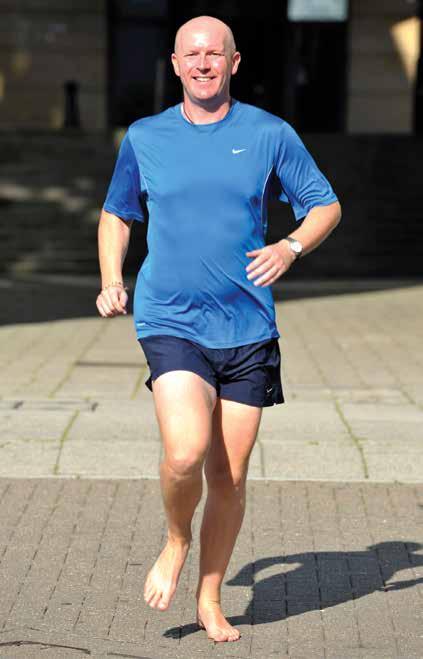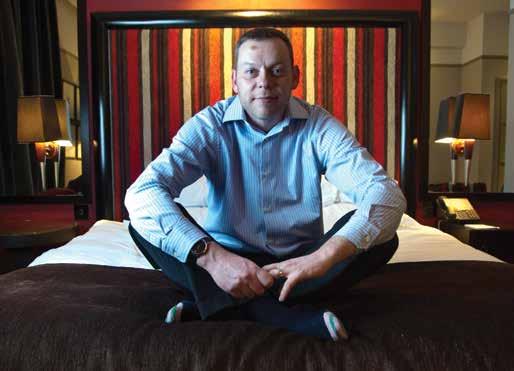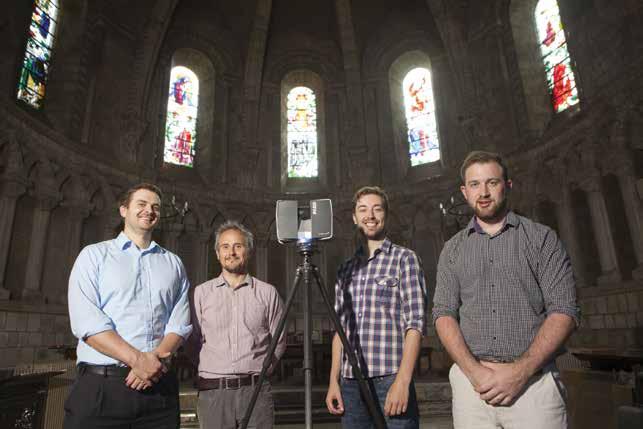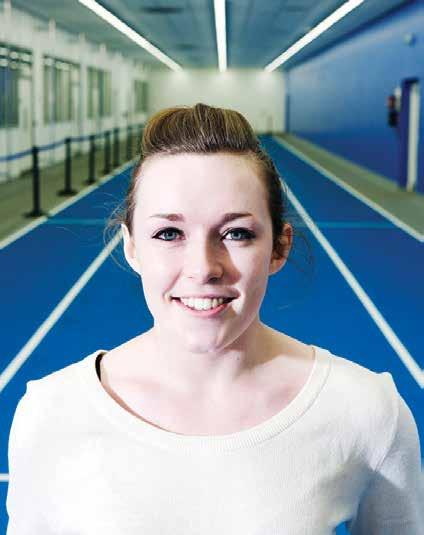
5 minute read
Running skills laid bare
Dr Mick Wilkinson, Senior Lecturer in Sport, Exercise and Rehabilitation, is launching Skilful Running clinics this autumn for people interested in improving their performance.
Dr Wilkinson is an expert in the physiology of exercise and has been a barefoot runner for more than eight years, completing the Great North Run entirely barefoot in 2011. His previous and ongoing research has shown that adopting the gait of a barefoot runner and increasing sensory feedback through the sole of the foot leads to better use of oxygen and reduces injury risks.
At the Skilful Running clinics, Dr Wilkinson will film runners on a treadmill and analyse their technique. He will then examine posture and rhythm, how and where the runner lands in relation to their centre of gravity and other key aspects of correct running form.
A world-renowned sleep specialist has become the subject of one of his own experiments for a one-off arts project.

Dr Jason Ellis, Professor of Sleep Science and director of Northumbria’s Sleep Centre, has had his brainwaves turned into music for a unique radio broadcast.
“He told me about Stoke Mandeville being the birth place of Paralympics and he had a competition coming up, so I drove down to capture that, as well as training at the Sports Academy. After that, he received the Freedom of Gateshead and I thought the project would be complete by photographing him at home.
“As the project grew I thought it would make a good exhibition. It has all just taken its own natural path and everything has been very coincidental as it’s evolved. I felt it was a very good opportunity to bring people, companies and organisations together and show sport and disability to the public and inspire people in the North East.
“We aim to show the exhibition in as many areas, schools, organisations in the North East for the rest of this year and beyond if possible.”
Stephen, whose athletics career includes 25 international medals for Great Britain, including Gold at Atlanta in 1996, where he became Britain’s youngest ever winner.
The title of the exhibition refers to Stephen’s intensive training regime and also to his desire to inspire others.
He added: “The idea of the exhibition is to try to inspire people to be the best they can be and give 100%. That’s the message we want to get out, especially to young people.”
100% Stephen Miller will be on display at Sport Central, Northumbria University, until Sunday 26 October.
Discover More
danprince.co.uk
The project began when Radio Arts, an independent artists’ group engaged in experimental broadcasting projects, sent out an international plea for submissions under the theme ‘Radio as Dreamland’.
Newcastle-based record label, Signals, reached out to the Northumbria sleep expert and asked for help to get biomedical data from sleeping subjects. That data would, in turn, be interpreted by experimental choral music group, Noizechoir, and turned into a 60 minute musical broadcast.
Not only did Dr Ellis help – he took it one step further by offering himself as the test subject.
He said: “I loved the suggestion of interpreting brainwaves musically and we agreed using the brain patterns of a sleep specialist would add another interesting element.
“When I took part there was so much going through my head thinking about what my sleep would look like, so it took me a while to drift off!
“As well as helping to create something truly unique, it has given me a valuable insight into what it feels like to be the focus of the experiments usually conduct.
“Sometimes people are reluctant to be open about their concerns or fears because they worry they will sound silly – but now I’ve been in their position I have an even better understanding and can help address their concerns before research begins.”
The recording took place at the centre at Northumbria, which is one of only three purposely-built academic facilities dedicated to the research of sleep in the UK.
The experiment was Jason’s first time sleeping in his own lab, which resembles a comfortable hotel room.
The results were then passed over to Noizechoir which worked to create a piece of music based on its interpretation of the brain activity. The Newcastle-based group is unique in that its members create music in response to location, architecture and environment as well as exploring other notions such as light pollution and radio landscapes.
Lindsay Duncanson, co-founder of Noizechoir, said: “We have never done anything with brainwaves before so it was an exciting project to be involved in. Our choir is generally interested in science and this experience has been an education as we have learned all about the process of sleep.
“Stepping into someone else’s world and creating something from that has been interesting. It sparked a lot of creative thoughts and ideas – it’s been great.”
The piece is one of only four submissions selected from around the world for the broadcast.
Along with the choral pieces performed and recorded by the Noizechoir, the broadcast will feature interviews and audio recordings of Jason’s experience to create a sound portrait of the sleep centre, exploring its aural landscape, its culture and the science that underpins it.
Dr Ellis was extremely impressed with the recording when he heard it for the first time.
He said: “It’s weird but interesting! The most striking thing for me is that can actually hear all the nuances of sleep – breathing, brain waves, muscle movements, heart – together in one medium. That for me is a first.”
Michael McHugh of record label Signals added: “The broadcast in itself is an exciting departure from traditional sleep science. The field of sleep research is a relatively new area of study and the broadcast offers a new and challenging opportunity to creatively re-interpret data that is usually presented graphically.” times. They also hit the ground with lower impact force and loading rates than over 80% of runners who land on the rear foot in conventional trainers Barefoot running cushions the force of landing, using the body’s ‘natural’ springs. It reduces joint forces and the muscular effort needed to deal with them, leading to gentle and efficient running. and supporting their body weight.
Runners at the clinics will be coached on how to fix technique errors and trained in the correct gait for skilful running – the style adopted by habitual barefoot runners.
“Sadly, the conventional running shoes worn by most runners block important sensations needed to learn to run with skill and also lead to impaired function and weakness of the feet and lower legs. Both lead to poor running form. Our coaching will help runners to recognise their faults, show them how to adopt a skilful barefoot running style and improve the function of their feet and legs, even if they don’t wish to give up wearing shoes.
Dr Wilkinson’s research shows that habitual barefoot runners have a distinctive running gait, using mid-foot landings, shorter stride lengths, faster stride rates and shorter ground-contact
Dr Wilkinson is a Master Coach of barefoot running technique trained by Lee Saxby, a world-renowned barefoot running coach and founder of Vivo-Barefoot Training Clinic. He said: “There is only one correct way for humans to run that respects our form and structure as evolution has shaped it. “This technique, like all movement, is a skill. Running with skill puts minimum stress on our bodies. People who grow up, walking and running barefoot naturally adopt the correct gait as their feet give them feedback on how they are interacting with the ground
“We use the model of skilful running developed by Lee Saxby to help runners. It is based on fundamental and irrefutable laws of biology and physics. The science isn’t new but Lee’s model is a way of applying the science into a practical coaching technique.”
Northumbria is rated among the best sport universities in the UK in the Which? University Guide 2013 – voted for by students.
Discover More
To register your interest in attending a Skilful Running clinic email james.wilkinson@northumbria.ac.uk







